 Do you feel like you are constantly bombarded with conflicting messages about protein?
Do you feel like you are constantly bombarded with conflicting messages about protein?
It seems like protein has recently taken on a “superfood” status. You will find no shortage of articles and social media posts shouting at you that you need to eat at least 100 grams (or even more) of protein every day. The more, the better, right? And if you get into a food discussion with family and friends, you are likely to hear someone say, “well you’re probably not getting enough protein.”
Take a look around at the grocery store and you will see “high protein” products are on every aisle – granola, waffles, yogurt, cake mix, cereals, cookies, chips. And of course, all the bars, powders and shakes!
Why is protein important?
Protein is essential for building, maintaining, and repairing all the tissues in your body – your bones, muscles, organs, blood, hair, nails, and more. It also helps keep your immune system strong, helps regulate blood sugars, and has a satiating effect to keep you feeling full in between meals. We definitely want to get enough protein. And, yes, you can achieve this with or without animal foods.
How much protein do I need?
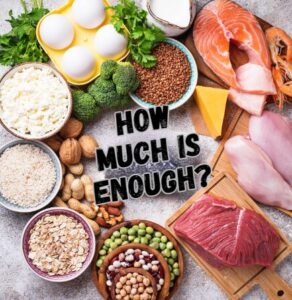 Roughly between 50-80 grams per day. If you are interested, this USDA calculator allows you to see the daily nutrient recommendations (including protein) based on the Daily Reference Intakes established by the Health and Medicine Division of the National Academies of Sciences, Engineering and Medicine.
Roughly between 50-80 grams per day. If you are interested, this USDA calculator allows you to see the daily nutrient recommendations (including protein) based on the Daily Reference Intakes established by the Health and Medicine Division of the National Academies of Sciences, Engineering and Medicine.
In some cases, higher amounts of protein can be beneficial. Examples include women who are pregnant, older people trying to preserve muscle mass and strength as they age, and body builders who are trying to significantly add muscle and bulk.
What’s the deal with “complete” vs “incomplete” protein?
Protein is made up of amino acids that join together to form long chains. If you have ever heard of “essential” amino acids, this means they are ones your body needs, but can’t make on its own. You have to get them from your food (or supplements if you’re not getting enough from your food). So, when it comes to protein in food, you will hear people talk about two types:
- “Complete” protein: provides all the essential amino acids. Example foods include animal foods like eggs, fish, poultry, meat, and dairy, and plant foods like soy products, quinoa, buckwheat, chia, hemp, nutritional yeast, and Ezekial bread.
- “Incomplete” protein: provides some, but not all, of the essential amino acids. Example foods include nuts, seeds, legumes, vegetables and whole grains.
You don’t need to memorize this or get too hung up on it. Any “incomplete” quickly become “complete” when you are eating a variety of plant-based foods. And you will get all the essential amino acids. You may not get them all in one meal, but you will get them over the course of a day or several days, which is what matters.
Here is a summary of the protein content in some common foods:
Keep in mind it’s important to get not only the protein you need but also all the other nutrients you need like fiber, vitamins, minerals, and antioxidants, which can easily get “pushed aside” if the diet is to hyper-focused on protein.
Zonya says:
The goal should be to get the right amount of protein without the “downside” ride-alongs like saturated fat and cancer promoting compounds like nitrosamines (from processed meats), HCAs (Heterocyclic amines) and PAHs (Polycyclic aromatic hydrocarbons), which are cancer-causing chemicals formed when muscle or organ meat are cooked at high temperatures. Not to mention insulin-like growth factor-1 (IGF-1), which is a growth hormone directly linked to cancer growth. In humans, elevated levels of IGF-1 levels can increase in your body when you eat animal protein and/or refined sugars.
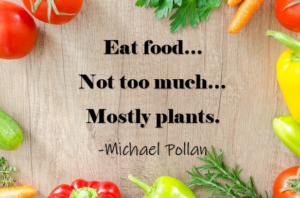 This study found that a high concentration of protein from meat increased the risk of cardiovascular disease compared to getting protein from nuts and seeds. We think Michael Pollan’s words are very appropriate here – “Eat food. Not too much. Mostly plants.”
This study found that a high concentration of protein from meat increased the risk of cardiovascular disease compared to getting protein from nuts and seeds. We think Michael Pollan’s words are very appropriate here – “Eat food. Not too much. Mostly plants.”
Some people may decide to make it “All plants.” Others may prefer “Mostly plants,” leaving room for a reasonable moderate amount of animal-based foods including meat, fish, eggs and dairy products.
Perception ≠ reality.
There tends to be a perception (especially among men) that you need to eat a lot of meat to be big and strong. Think about this for a minute. First, think about one of the strongest animals on Earth…gorillas. What do they eat? A ton of leaves and grass and seeds and fruits. A perfect example of how our bodies are perfectly happy to use plants as their protein source. If you are thinking, “seriously?”, check out the movie The Game Changers. It is an eye-opening documentary showing how a plant-based diet significantly improved the performance and health of some extremely impressive athletes, including those involved in mixed martial arts, powerlifting, ultra marathons, NFL football, and more.
Is it possible to be protein deficient?
In the U.S. and most developed countries, protein deficiency is rare. For those eating the Standard American Diet, which tends to be meat heavy, there is no shortage of protein. Even for those eating plant-predominant diets, protein consumption will be sufficient if it is whole-food plant-based, with ample beans, grains, vegetables, nuts and seeds. For those on a plant-exclusive diet, many experts recommend eating three servings of legumes each day to prevent falling short.
If someone doesn’t eat animal products and eats a fair amount of junk food (lots of cookies, crackers, chips, candy, you get the picture), he or she will likely not get enough protein. Some studies have also shown that a percentage of older Americans may not be getting enough protein. There are several potential causes including simply eating fewer calories as people age. And it’s not just protein. In many cases, these individuals were deficient in other key nutrients as well.
If you aren’t getting enough protein, symptoms might include brittle hair and nails, flaky skin, getting sick more frequently, muscle weakness and fatigue. Your doctor can run tests to see if you should adjust your protein consumption.
Is there a downside to eating too much protein?
 The short answer is yes. Excess protein can put a lot of stress on your kidneys, which are required to get rid of it. This can lead to dehydration, kidney damage, and also increases the risk of kidney stones (especially animal proteins).
The short answer is yes. Excess protein can put a lot of stress on your kidneys, which are required to get rid of it. This can lead to dehydration, kidney damage, and also increases the risk of kidney stones (especially animal proteins).
A plate loaded up with more animal protein has less vegetables and grains, elbowing out beneficial antioxidants and fiber, which 95% of Americans don’t get enough of. And if most of your protein is coming from meats, especially processed meats, there are other risks that go up including all the chronic diseases like cancer, heart disease and diabetes.
What about protein powders?
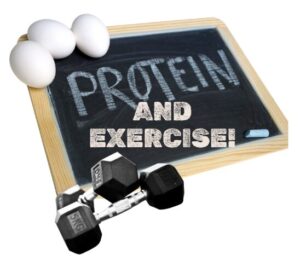 Most people don’t need protein powders since they are getting adequate protein from their foods. However, if someone has a need or a preference for protein powders, it is useful to know that protein powders can come from various sources including eggs, milk (like casein or whey), or plants (like brown rice, hemp, peas, soybeans). It is important to read the ingredient labels because they often contain added sugars, sodium, artificial sweeteners, thickeners, and other additives. Keep in mind, just like other dietary supplements, these powders are not regulated by the U.S. Food & Drug Administration.
Most people don’t need protein powders since they are getting adequate protein from their foods. However, if someone has a need or a preference for protein powders, it is useful to know that protein powders can come from various sources including eggs, milk (like casein or whey), or plants (like brown rice, hemp, peas, soybeans). It is important to read the ingredient labels because they often contain added sugars, sodium, artificial sweeteners, thickeners, and other additives. Keep in mind, just like other dietary supplements, these powders are not regulated by the U.S. Food & Drug Administration.
We hear some people say they use protein powders to build or maintain muscle. Remember that protein on its own doesn’t build or maintain muscle. Exercise does! Especially resistance training. If you are doing extreme workouts, like body building, you may need to amp up your protein to help rebuild and repair your muscles. This protein doesn’t have to come from protein powders – it can also come from REAL food. And for most of us (who aren’t doing extreme workouts every day), we most likely get plenty of protein from our food, even without supplementing with powders or shakes.
What about soy protein isolate, which is found in a lot of grocery store foods?
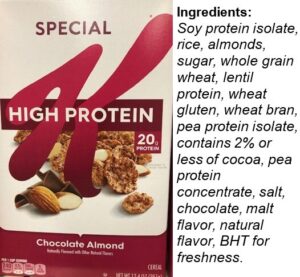 Soy protein isolate has become a popular ingredient in pre-packaged foods. You will find it in a lot of protein bars and shakes, cereals, cookies, crackers, dairy alternatives, and plant-based meats, just to name a few.
Soy protein isolate has become a popular ingredient in pre-packaged foods. You will find it in a lot of protein bars and shakes, cereals, cookies, crackers, dairy alternatives, and plant-based meats, just to name a few.
To make it, soybeans go through a chemical process to remove the fiber, carbs, fats and other nutrients to create a highly concentrated form of protein. While it is a good source of protein, it does go through a decent amount of processing and is often incorporated into pre-packaged foods with other not-so-great ingredients. Unless it is organic, it likely comes from genetically modified soybeans and may have been exposed to pesticides.
Instead of getting your protein from these products, we encourage you to focus on less processed soy products like organic edamame, tempeh or tofu, which also have fiber and other beneficial nutrients. And of course, protein from all the other REAL foods!
What is the takeaway?
Yes, we know we sound like a broken record!
Eat a wide variety of vegetables, fruits, legumes, nuts, seeds, and whole grains. And some quality meats, seafood, eggs, yogurt and cheese if desired. In almost all cases, the nutrients – including the protein – will all take care of themselves!
Let’s call it food freedom!
Do you have other questions about protein?
What are your thoughts, please share with us!

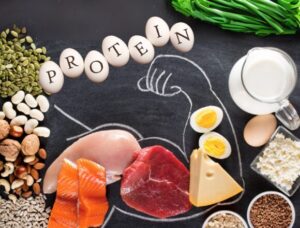
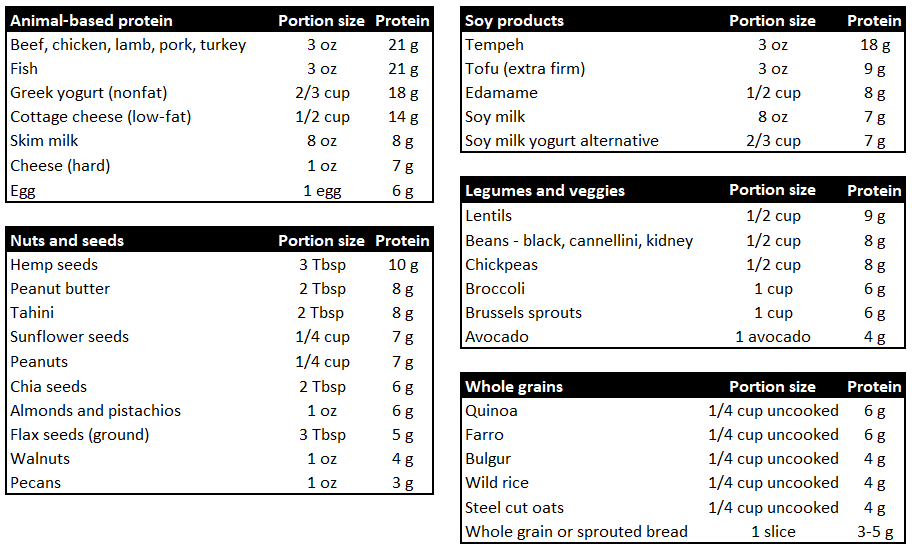
Great read! Thank you!
Thank you for separating out all the misunderstandings of protein!! This was what I needed to hear!